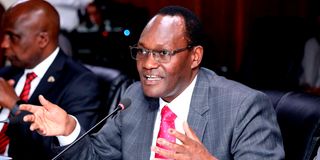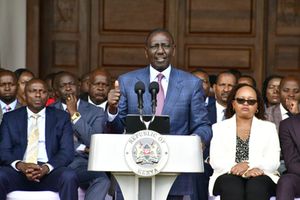Treasury urges MPs to pass proposals in Finance Bill

National Treasury Principal Secretary Chris Kiptoo.
The National Treasury wants Parliament to adopt tax measures contained in the Finance Bill, 2024 in order to raise revenue to pay Kenya’s debt that stands at Sh11.2 trillion.
Treasury defended the additional taxes and an expanded tax base, arguing that Kenya’s debt situation could become worse in the medium term.
Treasury Principal Secretary Chris Kiptoo told the National Assembly Finance and National Planning Committee that the debt to GDP ratio stands at 72 per cent, “which is way above the 55 per cent set in the Public Finance Act”.
Dr Kiptoo told the team chaired by Molo MP Kuria Kimani that the debt situation warrants the need to put more Kenyans in the tax bracket.
He said the country’s debt carrying capacity is at the lowest level, having risen from a low risk in 2014 to high risk in 2020.
“The law requires that the best sustainable debt would be at 55 per cent. When we came to Parliament to seek the change of the law, we were at 67 per cent,” Dr Kiptoo said.
“Our capacity to carry more debt is not sustainable so we have to raise revenue and cut expenditure. Any further accumulation of debt would mean Kenya will have no fiscal space.”
The PS appeared before the committee to defend the proposals contained in the Finance Bill, 2024 that have elicited widespread anger.
The bill seeks to impose numerous taxes on essential commodities, including 16 per cent VAT on bread and 25 per cent on crude and refined vegetable oils.
It also proposes 16 per cent VAT on financial services and an increase of excise duty on financial services from 15 to 20 per cent.
The proposed law will impose a 16 per cent VAT on forex transactions and processing of cheques as well as 10 to 20 per cent rise in the cost of M-Pesa and money transfer charges.
It also proposes an annual 2.5 per cent motor vehicle tax, based on the value of the vehicle and the eco levy of Sh150 per kilogramme on articles of plastic packaging materials.
The National Treasury seeks to net at least Sh58 billion from the motor vehicle tax.
The Finance Bill, 2024 seeks to raise Sh302 billion for the Sh3.9 trillion budget in the 2024/25 financial year.
Dr Kiptoo told the lawmakers that Kenya would need Sh1.1 trillion to pay interest on the ballooning debt in the next fiscal year.
“We are talking of Sh1.1 trillion which we require to pay interest on our loans. We must pay our debts, otherwise we would be charged for defaulting. It means that for every Sh10 that the Kenya Revenue Authority (KRA) collects, Sh6 would go to the repayment of the loans,” Dr Kiptoo said.
“We must reverse this situation by 2028. The tax measures in the Finance Bill, 2024 are consistent with this objective. We have cut expenditure by about Sh300 billion.”
The PS added that Kenya’s debt rose from low risk in 2014 to moderate risk in 2018 and was downgraded in 2020 to the high-risk category.
The committee, however, told Dr Kiptoo to explain why tax measures for the current financial year failed to match up to revenue targets.
It was after he said the Finance Act, 2023 was expected to yield Sh214 billion but the KRA collected Sh131 billion, a 53 per cent performance.
Dr Kiptoo said excise duty measures were expected to raise Sh7.6 billion but KRA had only realised Sh3.5 billion by last month.
“This is an area we are below target by -45 per cent. On the Tax Procedure Act, the yields were expected to be Sh67.9 billion as at end of May. We got Sh60 billion, an 89 per cent performance. This is good,” Dr Kiptoo said.
“We targeted to collect Sh16.5 billion from income tax but got Sh8.3 billion or 51 per cent. We may not reach 70 per cent.”
Dr Kiptoo told the committee that KRA collected Sh37.7 billion out of the target of 40 billion in VAT as of May, 2024.
“For the Housing Levy, we collected Sh47.5 billion or 80 per cent of the Sh59.5 billion target. We may reach 90 per cent by end of June,” Dr Kiptoo said.
He added that the Miscellaneous Fees and Levies Act targeted Sh22.7 billion.
“We have not achieved this increase. We lost Sh16 billion, with the performance being negative,” he said.
Dr Kiptoo added that the 2023 financial tax was to raise Sh214 billion but KRA has raised Sh134 billion.
He said the areas KRA did not perform well include the harmonisation of the import declaration fee rate that was reduced and the Railway Development Levy (RDL) which was cut from 2.5 to 1.5 per cent.
Dr Kiptoo added that the 17 per cent Export and Import Levy netted Sh314 million following a drop in quantities of cement, clinker, iron ore and steel.
He said Treasury expects to raise Sh84.4 billion from the taxes proposed in the Finance Bill.
Dr Kiptoo said the Treasury plans to raise Sh32 billion in VAT, Sh63 billion in excise duty and Sh1.3 billion from Tax Procedures Act measures.





